A Devotional Commentary on the Gospel Narrative (8 vols.)
Digital Logos Edition
This product has been transferred from Community Pricing to Pre-Pub. The actual funding level may be lower than it appears, which could delay production. The amount of funding still needed will be evaluated and updated soon.
Overview
In the series A Devotional Commentary on the Gospel Narrative, noted Tractarian Isaac Williams shares his thoughts on the Gospels of the four evangelists—Matthew, Mark, Luke, and John—across eight volumes. Williams was a member of the controversial Oxford Movement, which placed the Anglican Church as one of three branches of the Catholic Church. (Other members included John Henry Newman and E.B. Pusey.) His perspective on the Gospels offers a glimpse into this intriguing corner of Christian history and thought.
Williams begins his Gospel narrative study series with a general overview of the Gospels, showing how Christ appears within them. The companion volume, A Harmony of the Four Evangelists, provides further insights in the relationships of the Gospels, serving as a helpful reference for the other volumes. In the rest of the series, Williams details each phase of Jesus’ life, from his birth to his ascension into Heaven as they are discussed in each Gospel.
With Logos Bible Software, these valuable volumes are enhanced by cutting-edge research tools. Scripture citations appear on mouseover in your preferred English translation. Important terms link to dictionaries, encyclopedias, and a wealth of other resources in your digital library. Powerful topical searches help you find exactly what you’re looking for. Tablet and mobile apps let you take the discussion with you. With Logos Bible Software, the most efficient and comprehensive research tools are in one place, so you get the most out of your study.
Key Features
- A comprehensive presentation of all four Gospels
- Studies of Jesus’ life, death, and resurrection as they appear across the Gospels
- Insight into the perspective of the Oxford Movement in the nineteenth century
- A Harmony companion text to the Gospel narratives
Product Details
- Title: A Devotional Commentary on the Gospel Narrative
- Author: Isaac Williams
- Series: A Devotional Commentary on the Gospel Narrative
- Publisher: Rivingtons
- Volumes: 8
- Pages: 4,194
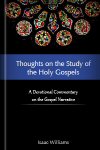
In Thoughts on the Study of the Holy Gospels, Isaac Williams discusses various aspects of the Gospels. Topics includ the characteristic differences in the four Gospels and analogies found within them. Williams also discusses the way the Lord manifests himself within the Gospels and how they describe his ministry and dealings with the Apostles.
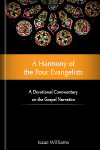
The Harmony is intended as a key or companion to the Devotional Commentary on the Gospel Narrative series, bringing all four Gospels together for a comprehensive view of Jesus’ life—from his birth in Bethlehem to the Resurrection.
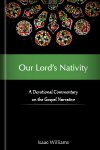
Our Lord’s Nativity covers Jesus’ birth and childhood, his baptism in the Jordan, and the first year of his ministry—concluding with the calling of St. Matthew.
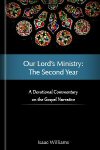
The Second Year begins with the pool of Bethseda and the charge of breaking the Sabbath; it continues through many miracles, teachings, and healings; and it concludes with the offense taken by most of Christ’s disciples because of his teachings on the Eucharist.
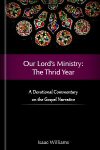
The Third Year begins with the third Passover, goes through Christ’s teachings in Galilee and Jerusalem, and covers the events of the last journey from Galilee to Jerusalem, concluding with the parable of the pounds.
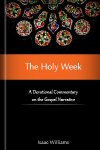
In The Holy Week, Isaac Williams comments on Jesus’ approach to Jerusalem, the atmosphere within the city, his teaching in the Temple, his discourse on the Mount of Olives, and the Last Supper.
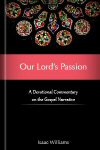
Our Lord’s Passion looks at the last hours of Jesus’ life, beginning with the agony in the garden of Gethsemane and his arrest. It continues through his condemnation before the Sanhedrin, his sentencing by Pilate, the way of the cross, the crucifixion, and Jesus’ burial. Isaac Williams offers thoughts on the sinner buried with Christ, as well as the dead in Christ, and he includes a hymn on funeral rites of the dead.
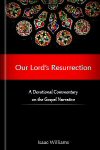
The first section of this volume, “The Grave Visited,” reviews various points of the Resurrection, such as the fears of the Pharisees and the measures they took to secure Jesus’ grave. It then narrates the visitors to his grave and his appearance to Mary Magdalene, as well as his other appearances and return to Jerusalem. It also covers the 40 days Jesus remained with his disciples, and it concludes with his ascension into Heaven.
About Isaac Williams
Isaac Williams (1802–1865) was an English vicar and prolific writer. He was a prominent member of the Oxford Movement. Also known as “Tractarians,” these High-Church Anglicans saw the Anglican Church as a branch of the Catholic Church. Williams attended Trinity College, Oxford, where he was a disciple of John Keble. He was ordained in 1829 and became curate in Gloucestershire before returning to Oxford to assist John Henry Newman. He was a fellow and tutor at Oxford. He wrote poetry and prose, including the influential tract On Reserve in Communicating Religious Knowledge.
Reviews
0 ratings

Michael Lyman
7/8/2014
Robert Hawker, the author of the Poor Man's Commentary and the Poor Man's Evening and Morning Portions, was NOT a supporter of the Oxford Movement. His grandson Robert Stephen Hawker converted to Roman Catholicism on his deathbed. I have notified Logos of this error and they have not changed the description. The Oxford Movement hadn't even begun in his life time and he was no fan of the papacy or any form of Roman Catholicism.